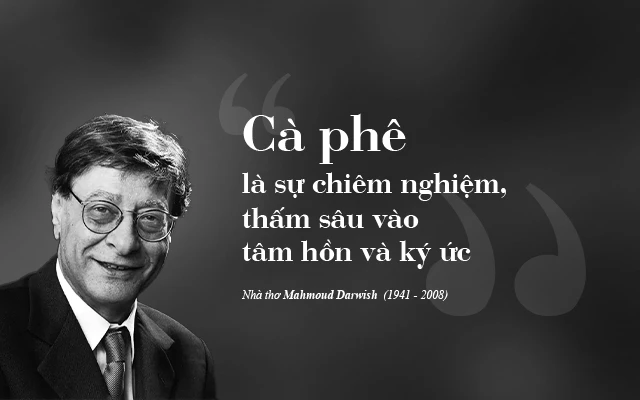
The Japanese have shaped the Tea Ceremony into a national ethic, an art of living conveyed through the enjoyment of a cup of tea. Meanwhile, Vietnam - one of the world's leading coffee powers, has the world's best Robusta coffee beans, has a long history of coffee enjoyment culture for hundreds of years, but up to now, the value of Vietnamese coffee is still in the low segment, mainly exported raw and has not been properly shaped as the inherent position of the industry and the country.
With the desire to bring the Vietnamese coffee industry to a new level, enhancing the value of coffee not only as a regular drink but also at the level of cultural coffee, artistic coffee, spiritual coffee... to philosophical coffee, worthy of the position of the world's coffee powerhouse - Trung Nguyen Legend Group has spent time and passion for many years to research the history, culture, art... of coffee in all areas of human life so that coffee becomes "Philosophical Coffee".
Throughout the journey of creation and development of Trung Nguyen Legend, the spirit of dedication to serving the community has always been the core through many action programs to Create great aspirations and great aspirations for the country; to build a new position for the Vietnamese coffee industry on the world coffee map and on this Journey, Trung Nguyen Legend wishes to join hands with national policy makers so that Vietnam will soon become a powerful country and have comprehensive influence on the world!
The Japanese did it!
We Vietnamese can do it too and do it better !
Spiritual imprint of the mirror
Originating in Ethiopia until its spread throughout the Muslim world in the 16th century, coffee was considered a gift from God, a divine drink that brought alertness, stimulated creativity, and strengthened faith. At that time, the preparation and enjoyment of coffee became a ritual that occupied a central position in Ethiopian society and the Muslim world. In particular, when introduced to the Ottomans, the coffee ritual with new brewing techniques invented by the Turks became a unique coffee culture, popular to this day.
In " Coffee - From the soil to the cup " Cenk Girginol describes the Muslim coffee ritual " as a culture because it has never existed simply as a beverage ". In the early days, coffee was only allowed to be drunk in monasteries and churches when practicing rituals. Coffee rituals were performed to express devotion to God, to pray for blessings, to be closer to heaven. When entering secular life, the coffee ritual became a means of social communication and was seen as a symbol of friendship, hospitality and sophistication. It holds an important position in social and cultural life, to open a dialogue, end disputes, express love and look to the future.
Therefore, all components of a coffee ceremony, from coffee ingredients, tools, methods and rituals of preparation and enjoyment, are carefully selected, meticulously prepared and solemnly performed. In particular, the tools and utensils for preparation and enjoyment are focused on from the manufacturing stage, because they are not only tools but also artifacts that reflect the traditional cultural identity of the community, the sacredness and respect in the ceremony, as well as the status of the host.
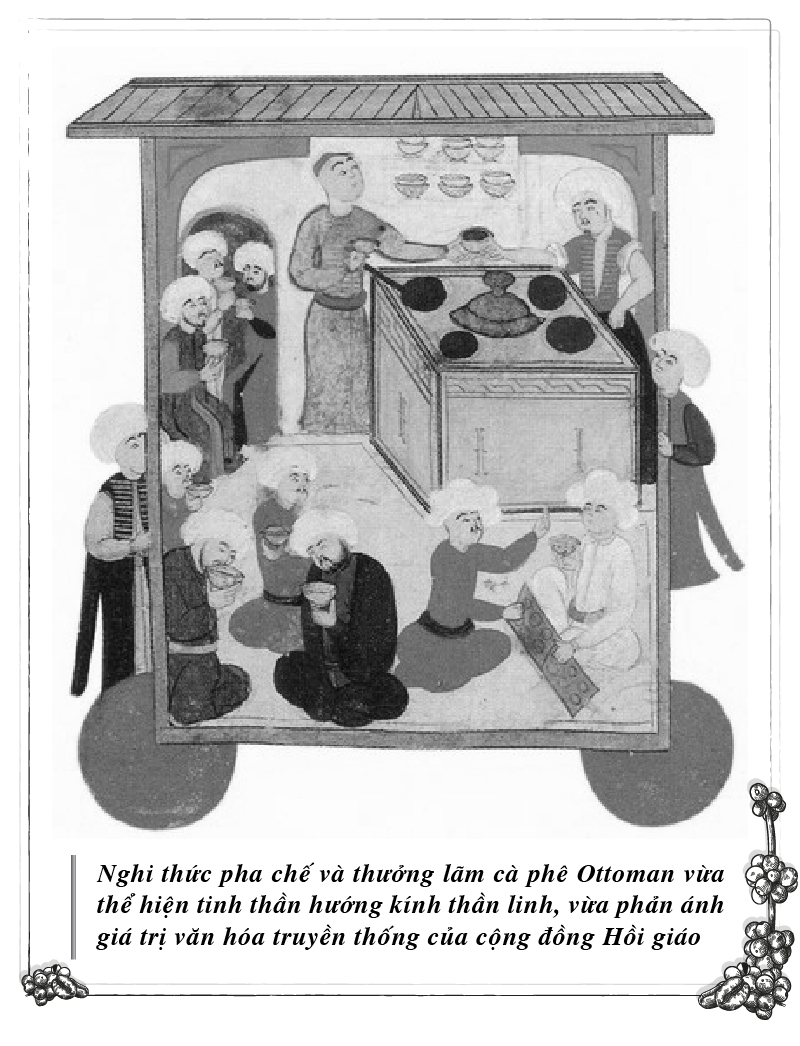
During the Ottoman period, the coffee ceremony used fresh coffee beans roasted in a pan, ground finely in a mortar, boiled with pure cold water in a cezve pot on hot sand, and used fincan cups placed in zarf stands, to serve the drinker on a tray decorated with an elaborate cover. In particular, with the importance of the coffee ceremony, all these tools, utensils, and items were meticulously crafted from design to motifs, and made of traditional materials, which have cultural and spiritual value in the lives of Muslims.
As one of the lands with rich copper ore reserves and famous traditional copper forging, this metal was widely used to craft kitchen tools and weapons during the Ottoman period because of its good thermal conductivity and long life. Moreover, in cultural life, copper has the properties of purification, attracting positive energy and blessings, so it is used to craft objects serving rituals. Therefore, most of the popular tools and utensils in the Ottoman coffee ceremony, from roasters, hand mills, coffee containers, cezve kettles, warming pots, trays, zarf stands... are crafted from copper or brass, besides a few made from other precious materials such as gold, silver, ceramics, aromatic wood... Decorative motifs are also associated with Ottoman cultural symbols and are elaborately and delicately made using traditional carving techniques, inlaying precious stones, diamonds, gold thread embroidery, silver thread...
In particular, using sand stoves to cook coffee is a characteristic of Ottoman coffee civilization. In terms of function, sand creates the right amount of heat, helps to cook evenly, and preserves the full essence of coffee flavor. Moreover, in the Islamic world, sand is also used to perform dry purification rituals, helping to clean oneself before praying, to show respect to the gods.
The meticulousness and meticulousness in crafting coffee-enjoying tools and utensils with aesthetic value like works of art not only shows the Ottomans' reverence for the gods but also expresses pride in the national cultural traditions. At the same time, in the secular life of Ottoman society, coffee is a symbol of hospitality and friendship. Making and serving coffee in sophisticated and splendid tools and utensils is a way for the Ottomans to honor the dignity of the connoisseur and affirm their status in society.
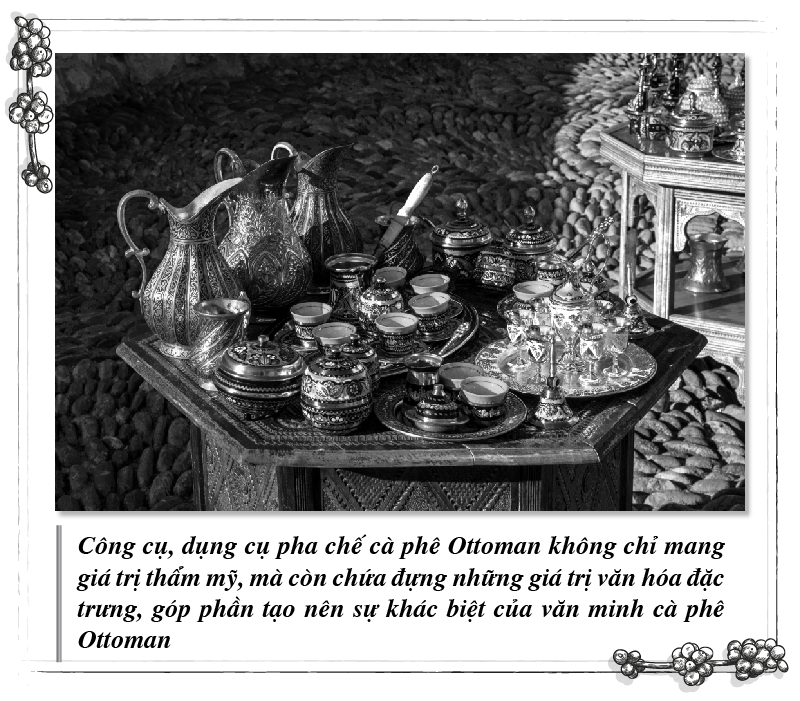
As soon as coffee became an important export item of the Ottoman Empire, Ottoman coffee culture spread to the entire Asia - Europe - Africa region , promoting the demand for coffee brewing and enjoying tools such as cezve pots, coffee cups, coffee trays... From there, the Ottoman handicraft industry system developed strongly, creating coffee tools with high economic and artistic value, contributing to shaping the special identity of Ottoman coffee civilization globally.
Cultural symbol of upward lifestyle
In the 17th century, coffee and coffee shops were introduced to Europe, becoming a source of energy for awakening and creativity, catalyzing the brilliant development of the Enlightenment era, creating a foundation for the remarkable progress of Europe in the next period. In the 19th century, European society had many changes in culture and society, due to the impact of the industrial revolution. This was also the time of increasing demand for coffee enjoyment in the world. Coffee and coffee shops were places where scientists and intellectuals gathered, researched, and disseminated new streams of thought and initiatives in all fields, shaping modern Western civilization.
In particular, at the end of the 19th century, the steam industry exploded. Countries from East to West applied advances in science and technology to shape their own unique coffee-drinking styles with inventions that brought new values and new lifestyles, such as: America created Instant Coffee (1901), Germany invented the coffee filter and the Pour-Over Coffee method (1908), France created the French Press coffee machine (1929)...
In the spirit of promoting intelligence, creativity, aiming to discover and create a new European lifestyle, along with the love of coffee and the recognition of the values that coffee contributes to the development of humanity, Italians invented and reformed coffee making tools, creating a new wave of cultural appreciation in Europe. In 1884, Italian businessman Angelo Moriondo (1851 - 1914) was granted a patent for the "Economical and Instantaneous Steam Coffee Machine". This is considered the first Espresso coffee maker to use steam, extracting the pure, original essence and aroma of coffee beans in the fastest time. From this feature, the term Espresso was born and spread throughout Europe.
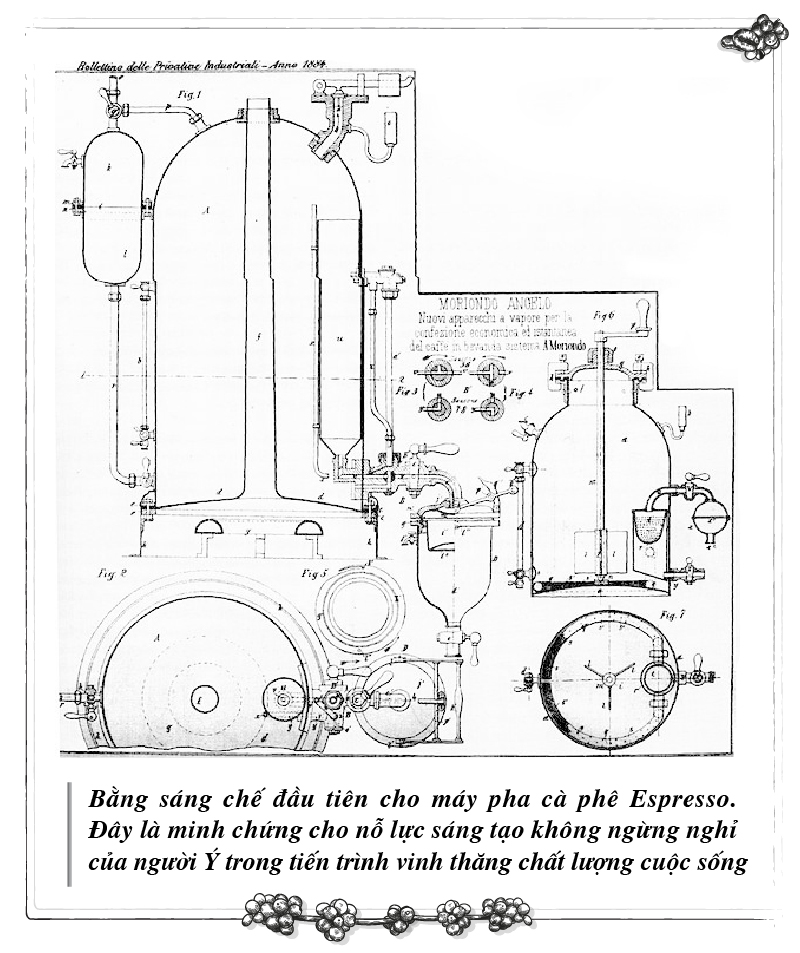
Not stopping there, at the Milan fair in 1906, Luigi Bezzera and Desiderio Pavoni introduced the Ideale machine. This was an improved version of Moriondo's design with many innovations, such as overcoming the difficulty of controlling the pressure when directly heating with fire, creating a steam pipe to release the steam accumulated under the boiler. In 1938, Giovanni Achille Gaggia (1895 - 1961) combined the operating principle of the piston to create the first pressure Espresso coffee machine, creating the premise for the modern Espresso era.
In the 20th century, with the strong development of technology and science, production machines and brewing equipment became more and more diversified. Once again, with the desire to identify the difference and contribute to human civilization, the Italians created the Moka pot. From here, the culture of enjoying coffee continued to create a new "revolution", helping many people to enjoy Espresso at home and bringing gender equality when women easily accessed coffee. The Moka pot was also honored as a symbol of the industry, when using aluminum to create the body of the pot. Before the Moka, no kitchen utensils were made of aluminum. Immediately after the Moka was born, aluminum became a familiar material in the kitchen and the mid-1930s was the golden age of aluminum kitchen products.
From the pioneering efforts to improve brewing tools, Espresso and Moka pots became symbols of a new lifestyle, bringing a sense of human transcendence. That is the role of human mastery in life, mastering the laws of nature, affirming the position of human on the journey of building the world. At the same time, the Italian style of enjoying coffee has opened up a new coffee civilization - the Roman coffee civilization, associated with technological and scientific factors.
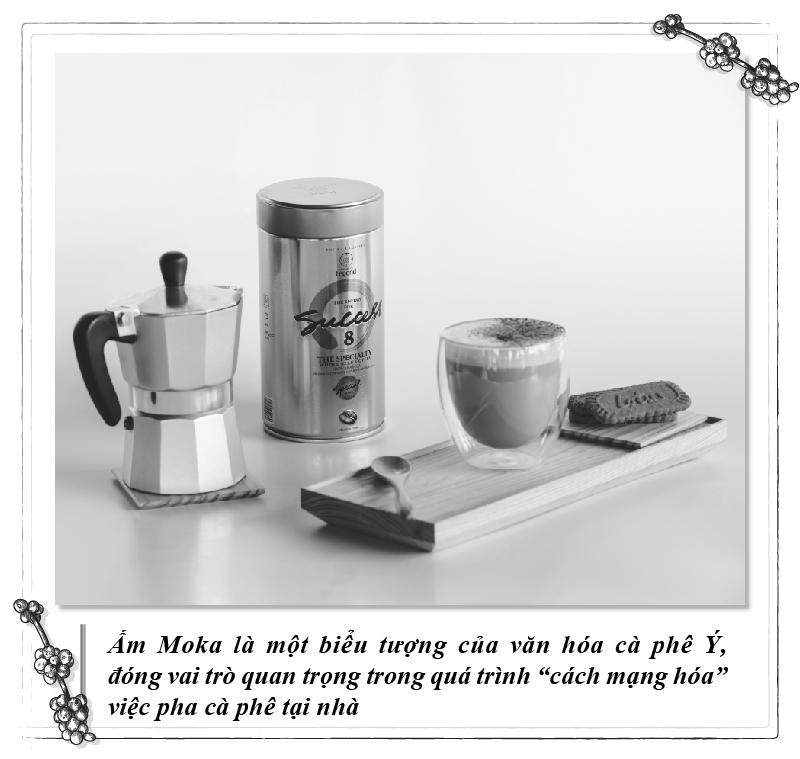
With a love for coffee and in-depth research on the history, origin and culture of coffee, Trung Nguyen Legend Group realized that coffee was born and developed in a cycle from East to West, then returned to its origin, searching for Eastern civilization. Founded in Buon Ma Thuot - the homeland of the world's best Robusta coffee beans, Trung Nguyen Legend desire to elevate coffee into art, culture, philosophy of life and ethics of life . Up to now, Trung Nguyen Legend has been making efforts to build the Zen Coffee civilization . Originating from the origin and cultural identity of Vietnam, contributing to the world coffee civilization.
Distilled from the quintessence of Ottoman coffee civilization - Roman and the convergence of Eastern philosophy, Zen Coffee with a drop of awakening coffee carries within it the philosophy of retreat, like a source of light guiding people according to the value system of Truth - Goodness - Beauty , always striving to study and practice hard to pursue the truth, pursue wisdom with love - goodness - service , to achieve true wealth and happiness.
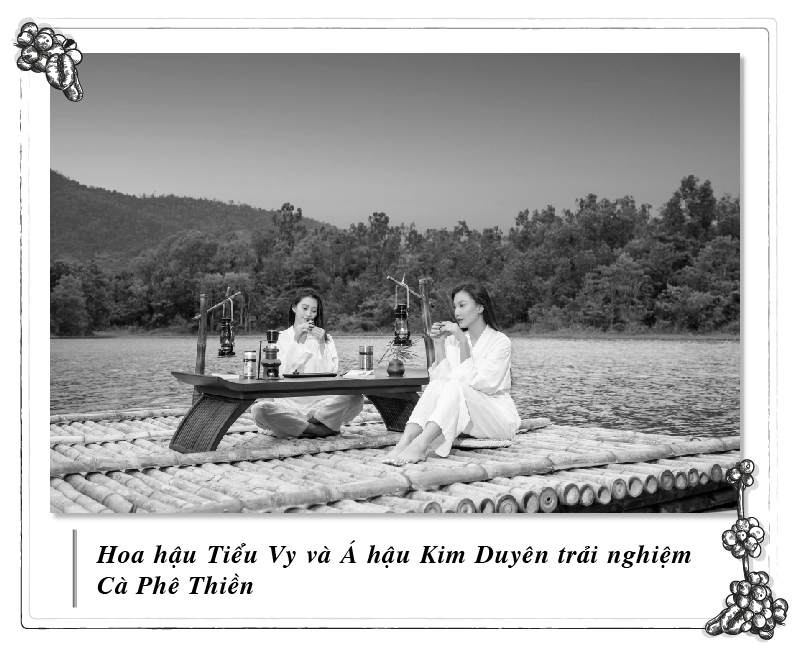
In that spirit , Trung Nguyen Legend has been gradually perfecting the Thien Coffee ecosystem from philosophy to products - services - tools for enjoying. In particular, the Thien Coffee enjoyment tools are researched and created by Trung Nguyen Legend from familiar natural materials such as ceramics, porcelain, silk, rattan, bamboo... of traditional craft villages, along with decorative patterns bearing cultural symbols such as bronze drums, bamboo stems ... Converging the soul of the land, the soul of the country, the soul of the profession... Combining excellent energy coffee products made from the world's best Buon Ma Thuot Robusta beans with special brewing and enjoyment tools, Trung Nguyen Legend creates a set of Coffee Meditation products that represent the 5 spirits of the new era: Desire - Strength - Breakthrough - Wealth - Awakening, awakening and cultivating the core strength within each individual.
[embed]https://www.youtube.com/watch?v=xxsSYrl0Gag[/embed]
We invite readers to watch the series of videos of Philosophical Coffee posted on the channel https://bit.ly/caphetrietdao
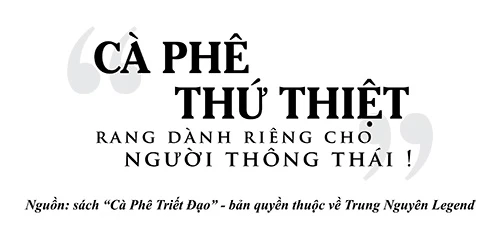
Read the next part: Coffee and the good choice to achieve happiness
Source link


























![[Photo] National Assembly Chairman Tran Thanh Man visits Vietnamese Heroic Mother Ta Thi Tran](https://vphoto.vietnam.vn/thumb/1200x675/vietnam/resource/IMAGE/2025/7/20/765c0bd057dd44ad83ab89fe0255b783)










































































Comment (0)